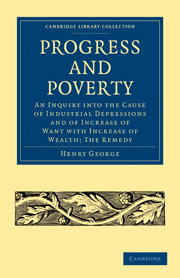 Progress and Poverty
Progress and Poverty Book contents
- Frontmatter
- PREFACE TO FOURTH EDITION
- Contents
- INTRODUCTORY
- BOOK I WAGES AND CAPITAL
- BOOK II POPULATION AND SUBSISTENCE
- Chapter I The Malthusian theory—its genesis and support
- Chapter II Inferences from fact
- Chapter III Inferences from analogy
- Chapter IV Disproof of the Malthusian theory
- BOOK III THE LAWS OF DISTRIBUTION
- BOOK IV EFFECT OF MATERIAL PROGRESS UPON THE DISTRIBUTION OF WEALTH
- BOOK V THE PROBLEM SOLVED
- BOOK VI THE REMEDY
- BOOK VII JUSTICE OF THE REMEDY
- BOOK VIII APPLICATION OF THE REMEDY
- BOOK IX EFFECTS OF THE REMEDY
- BOOK X THE LAW OF HUMAN PROGRESS
- CONCLUSION
- INDEX
Chapter II - Inferences from fact
Published online by Cambridge University Press: 07 September 2011
- Frontmatter
- PREFACE TO FOURTH EDITION
- Contents
- INTRODUCTORY
- BOOK I WAGES AND CAPITAL
- BOOK II POPULATION AND SUBSISTENCE
- Chapter I The Malthusian theory—its genesis and support
- Chapter II Inferences from fact
- Chapter III Inferences from analogy
- Chapter IV Disproof of the Malthusian theory
- BOOK III THE LAWS OF DISTRIBUTION
- BOOK IV EFFECT OF MATERIAL PROGRESS UPON THE DISTRIBUTION OF WEALTH
- BOOK V THE PROBLEM SOLVED
- BOOK VI THE REMEDY
- BOOK VII JUSTICE OF THE REMEDY
- BOOK VIII APPLICATION OF THE REMEDY
- BOOK IX EFFECTS OF THE REMEDY
- BOOK X THE LAW OF HUMAN PROGRESS
- CONCLUSION
- INDEX
Summary
The general acceptance of the Malthusian theory and the high authority by which it is endorsed, have seemed to me to make it expedient to review its grounds and the causes which have conspired to give it such a dominating influence in the discussion of social questions.
But when we subject the theory itself to the test of straightforward analysis, it will, I think, be found as utterly untenable as the current theory of wages.
In the first place, the facts which are marshaled in support of this theory do not prove it, and the analogies do not countenance it.
And, in the second place, there are facts which conclusively disprove it.
I go to the heart of the matter in saying that there is no warrant, either in experience or analogy, for the assumption that there is any tendency in population to increase faster than subsistence. The facts cited to show this simply show that where, owing to the sparseness of population, as in new countries, or where, owing to the unequal distribution of wealth, as among the poorer classes in old countries, human life is occupied with the physical necessities of existence, the tendency to reproduce is at a rate which would, were it to go on unchecked, some time exceed subsistence. But it is not a legitimate inference from this, that the tendency to reproduce would show itself in the same force where population was sufficiently dense and wealth distributed with sufficient evenness to lift a whole community above the necessity of devoting their energies to a struggle for mere existence.
- Type
- Chapter
- Information
- Progress and PovertyAn Inquiry into the Cause of Industrial Depressions and of Increase of Want with Increase of Wealth; The Remedy, pp. 92 - 114Publisher: Cambridge University PressPrint publication year: 2009First published in: 1881
